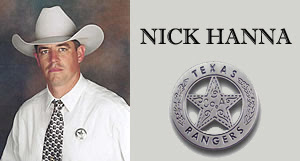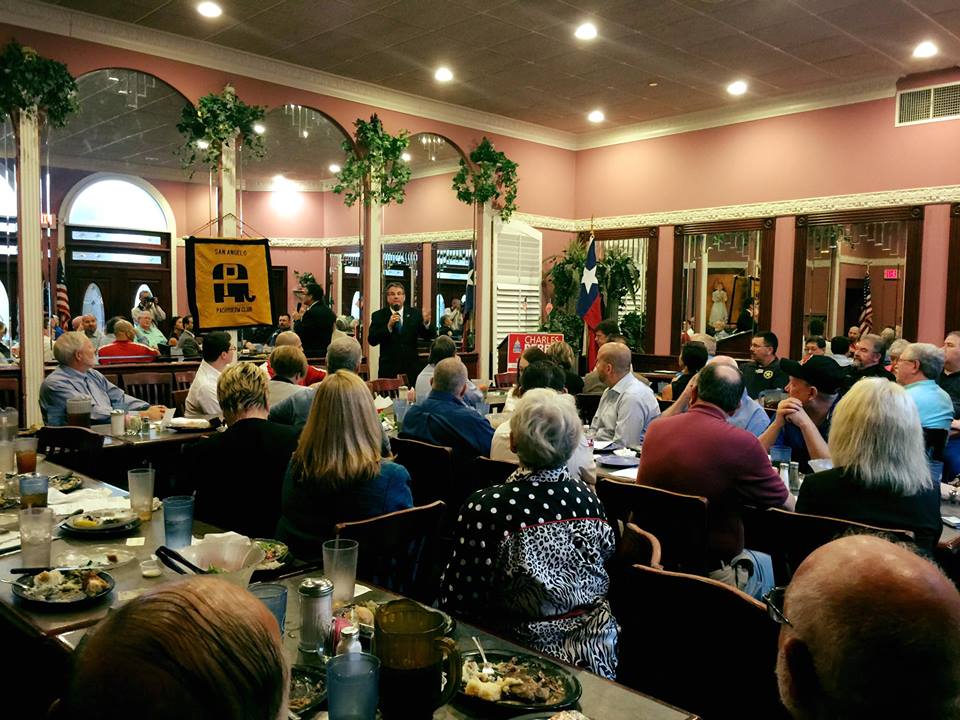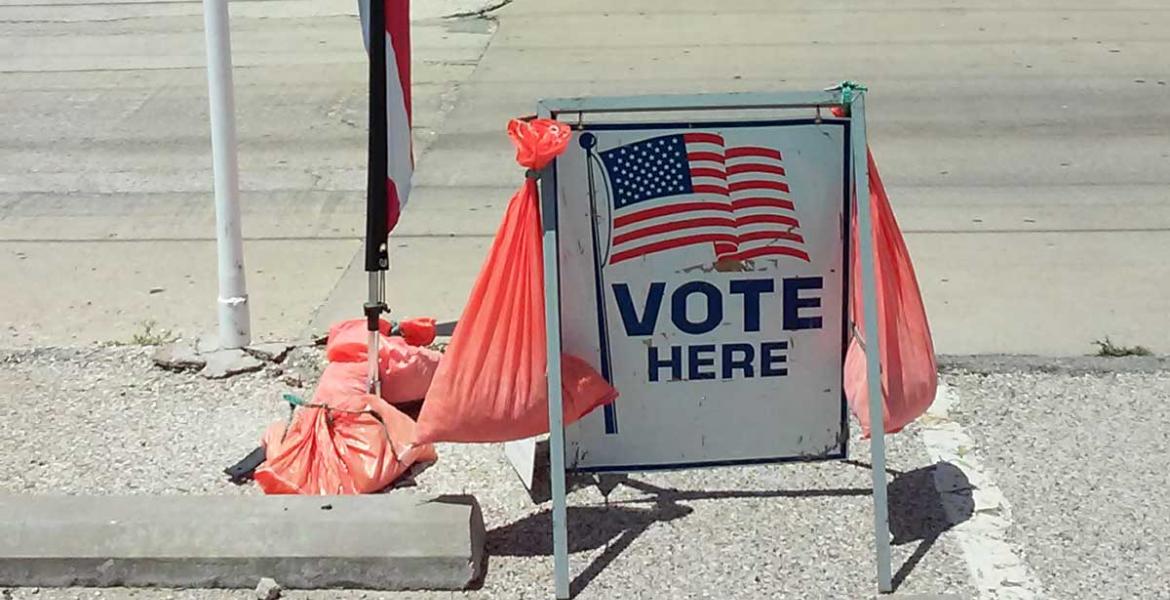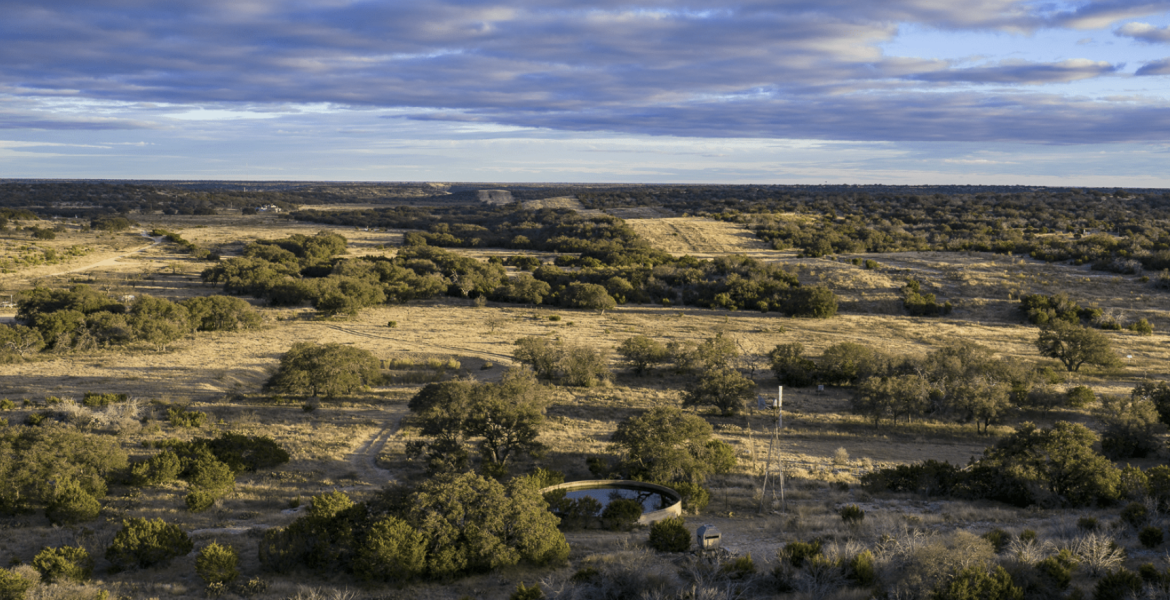SAN ANGELO, TX - A few weeks ago, members of the San Angelo Pachyderm Club welcomed guest speaker Texas Ranger Nick Hanna who gave an informative speech highlighting his duties as a law enforcement officer.

During his speech, Hanna told his avid listeners that the Christmas holidays are probably his favorite time of year, reflecting on a (then) recent event he had attended with his family. Regarding the season, he said, "It just embodies the things that I personally, and a lot of other law enforcement officers enjoy: peace, joy, hope and love." He added that sometimes "San Angelo gets a bad rep, but, for the most part, it's a nice place to live."
As for his perspective of the overall state of law enforcement in San Angelo, Hanna said, "In the current environment today, with the tax on law enforcement, and some of the bad media that LE has been subjected to, a lot of citizens are concerned. I get approached often, and some people will say, 'How are you guys doing? We're worried about y'all.' We in law enforcement all feel the same pain. We hate to see officers under attack and families lose their husbands and their fathers; it's very personal, but we're not dissuaded in the law enforcement community."
Hanna noted that whether he's at the coffee shop, out having lunch somewhere, or even pumping gas at the convenience store, so many people have come up to him and thank him for his service.
Addressing the audience, he said, "That's what I want to encourage you guys to do. When you see an officer, or a military person, don't hesitate to come up and thank them, and especially in front of their family because their family really pays the price. We get called out on holidays, the middle of the night, on weekends, and these guys know first hand it's expected, but when your wife and/or kids hear the call, they're a big part as to who we are as law enforcement officers."
Hanna also explained the dichotomy of the law enforcement community being recognized as peace keepers.
"Although we'd probably love the thought of peace more than anybody, ironically it is us who are in constant conflict, maybe more so than any segment of our society, in the battle between right and wrong, and good and evil, but there is not going to be a lack of resolve in the police department to get things done, as we are accountable to the citizens. We understand that when we go to work in the mornings. You're not going to read in the newspaper: 'Law enforcement surrenders to bank robber.' It doesn't happen. Whatever price that needs to be paid to keep the peace and keep law and order, especially in San Angelo, these local guys, SAPD and TGCSO, are the guys who are going to get that done."
Hanna explained that the Texas Rangers partner with SAPD and TGCSO on a routine basis, and with other agencies in neighboring counties.
"In my opinion the Texas Rangers are the smallest division in DPS, and also the most misunderstood division," he said. "I hardly go a day without somebody asking me, 'What do Rangers do? I want to understand what your job responsibilities are.'"

Giving a little historical background on how they came to be, Hanna said, "The Texas Rangers were established in about 1823 by Stephen F. Austin. They were really picked from a bunch of farmers, maybe a blacksmith, and just laymen. Their job was to range over Texas and help secure the colonists. As the decades have passed, the Rangers have been everything between a soldier, and of course now a policeman. We've become part of Texas history and have such an image; I'm proud to be part of it. It also offers us a lot of advantages, especially when we're dealing with some other agencies, or even other states. I always tell guys in some of my interview classes, 'When you're talking to someone and you want to be successful, they have to know you, like you and be able to trust you. This is one of the things the Ranger badge brings to me personally when I'm dealing with these other agencies or other states so it's a great working environment for the Rangers."
Overall, DPS has five divisions. When Hanna was promoted into the Rangers in 2003 and went to Brownwood, there were 116 commissioned members, which was a "bit behind the curve as far as the the needs of the state of Texas," which has about 25 million people right now.
Hanna said, "You're talking about a small group of guys tasked with some pretty big cases. We've progressed in the last 13 years to where now the Ranger commission has around 162 commissioned Rangers. When I started, there were just 99 Ranger Sergeants, so you can see how it's increased. We also have about 66 support personnel who are within the Ranger division, [and whom] are Peace Officers, but they're not Rangers. They're part of our SWAT team, JOIC, Bomb Squad, Border Liaison, and BOLO officers. We've developed into a multi-faceted organization within DPS that can offer a lot of services."
Hanna continued to explain that Rangers do general criminal investigations on major investigations.
"Some of the things about the Rangers that many are not aware of is we have a group called the 'Officer Involved Shooting Working Group,' he stated. "That is a group of Rangers who are selected, one per company, and I'm the member representative for my company. We meet in Austin and review police shootings where a local D.A. has asked us to come in and review these shootings."
Hanna added, "It behooves them (other departments) to have an independent party come in and look at things like shootings or complaint investigations just for the voracity of the fact to establish that an independent person came along and looked at this complaint or shooting and it's been thoroughly investigated. In other words, we can be objective without any personal feelings."
He then gave the example of the Twin Peaks shooting in Waco.
"I equate it to walking up to a fire ant hill and kicking it, and if you've ever done that, you know the ants are going every which way," Hanna explained. "We spent a lot of time breaking that down and we presented the shooting to a grand jury in Waco. All the officers involved were found to be justified in the shooting in that type of incident."
Additionally, he shared how the Texas Rangers assisted with the recent terrorist shooting of Dallas police officers and also touched on another case which made national headlines: the FLDS incident in Eldorado, Texas.
Some of the other duties and divisions of the Texas Rangers include a Public integrity Unit to where if someone thinks that a judge or elected official has engaged in some wrongdoing, they'll go to where ever the situation dictates to assist.
Hanna continued, "We also have an operating group called CNU, which is essentially Crisis or Hostage Negotiations Unit. Most PD's have that, but a lot of your smaller agencies don't, so we offer our services to engage in things to help with a hostage or armed/barricaded subject."
Hanna said the Rangers also engage in executive protection, and they have a UCIP team, which is the Unsolved Crime investigation Program.
"I took part in that for about eight years and recently gave up that role," he said. "We still work some closed cases here locally, but that team goes back and looks at unsolved homicides."
Hanna mentioned that Rangers also do normal everyday things, and many times, they're called to testify in court hearings.
"When you step into a courtroom, it really is the last arena for me in the battle of good versus evil be it civil or criminal," he noted. "You have to be prepared as there are a lot of parallels. I've had a lot of experience testifying, which is one of the things I enjoy about being a Ranger."
Hanna stated that recently, he had some new experiences regarding the FLDS case.
He said, "We had some underage girls who were brought over from Canada, so I reached out to the RCMP (Royal Canadian Mounted Police) for assistance. The 11 and 12-year-old girls were being brought across for the purpose of sexual abuse, who would then be married off to these 60-year-old-men. I reached across to the RCMP to get some simple documents such as birth certificates to establish the dates and ages of these young girls. Lo and behold, that started a dialog with our two agencies, and once we completed our investigations down here in Texas, they were able to plug into our evidence and they've made some cases up in Canada."
Hanna also described how, about two months ago, he flew up to British Columbia and testified in the supreme court in Canada, which he described as "a pretty neat experience."
In their courtrooms, you actually address the judge as 'My Lord' instead of 'Your Honor,' he said. "The prosecution and the defense each wear a robe with a little goblet-type thing hanging down on the robe, and instead of asking questions from each desk, they approach a podium. Their court lasts two hours in the morning with a 15 minute break and then 2 hours in the evening, so you get 3 1/2 hours of court time; whereas here, in Texas, we would go 12-13 hours sometimes, so I was a little surprised with the pace of things."
As for the verdict, he was told the judge has 90 days to render his verdict.
"It was a cool experience, as you never know what you're going to get into once these things start," said Hanna.

He then answered a few questions from the audience and the meeting was adjourned.
For more information on the Texas Rangers, check out their website at https://www.dps.texas.gov/texasrang….
Subscribe to the LIVE! Daily
Required






Post a comment to this article here: